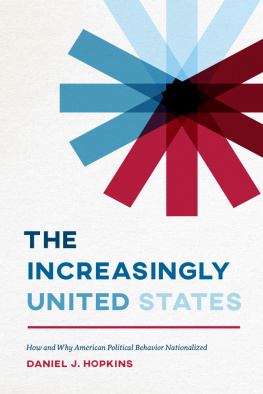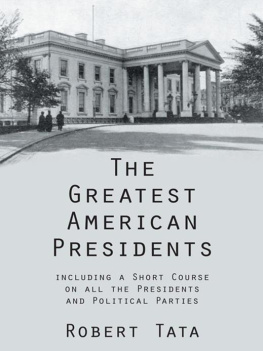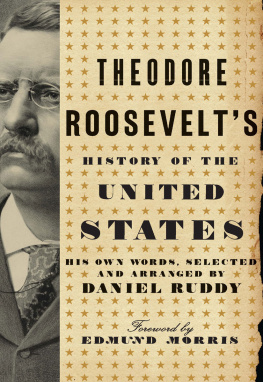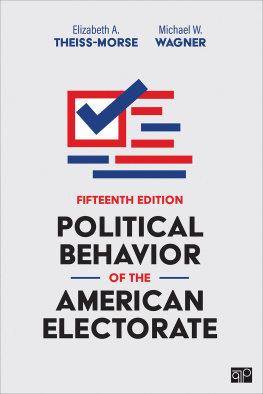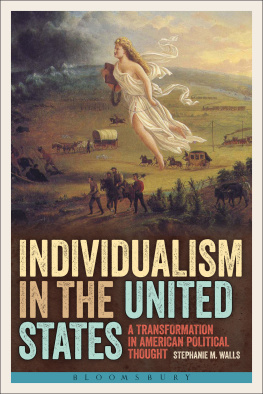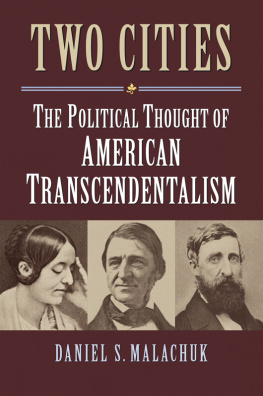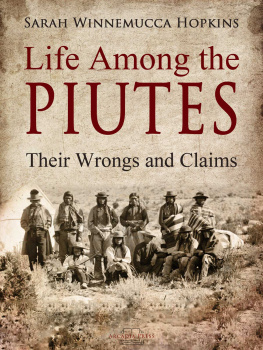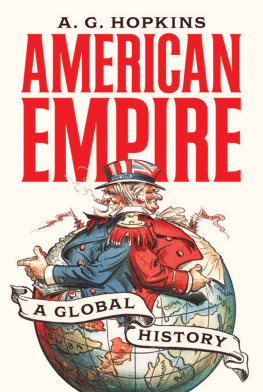The Increasingly United States
Chicago Studies in American Politics
A SERIES EDITED BY BENJAMIN I. PAGE, SUSAN HERBST, LAWRENCE R. JACOBS, AND ADAM J. BERINSKY
Also in the series:
LEGACIES OF LOSING IN AMERICAN POLITICS by Jeffrey K. Tulis and Nicole Mellow
LEGISLATIVE STYLE by William Bernhard and Tracy Sulkin
WHY PARTIES MATTER: POLITICAL COMPETITION AND DEMOCRACY IN THE AMERICAN SOUTH by John H. Aldrich and John D. Griffin
NEITHER LIBERAL NOR CONSERVATIVE: IDEOLOGICAL INNOCENCE IN THE AMERICAN PUBLIC by Donald R. Kinder and Nathan P. Kalmoe
STRATEGIC PARTY GOVERNMENT: WHY WINNING TRUMPS IDEOLOGY by Gregory Koger and Matthew J. Lebo
THE POLITICS OF RESENTMENT: RURAL CONSCIOUSNESS IN WISCONSIN AND THE RISE OF SCOTT WALKER by Katherine J. Cramer
POST-RACIAL OR MOST-RACIAL? RACE AND POLITICS IN THE OBAMA ERA by Michael Tesler
LEGISLATING IN THE DARK: INFORMATION AND POWER IN THE HOUSE OF REPRESENTATIVES by James M. Curry
WHY WASHINGTON WONT WORK: POLARIZATION, POLITICAL TRUST, AND THE GOVERNING CRISIS by Marc J. Hetherington and Thomas J. Rudolph
WHO GOVERNS? PRESIDENTS, PUBLIC OPINION, AND MANIPULATION by James N. Druckman and Lawrence R. Jacobs
TRAPPED IN AMERICAS SAFETY NET: ONE FAMILYS STRUGGLE by Andrea Louise Campbell
ARRESTING CITIZENSHIP: THE DEMOCRATIC CONSEQUENCES OF AMERICAN CRIME CONTROL by Amy E. Lerman and Vesla M. Weaver
HOW THE STATES SHAPED THE NATION: AMERICAN ELECTORAL INSTITUTIONS AND VOTER TURNOUT, 19202000 by Melanie Jean Springer
THE AMERICAN WARFARE STATE: THE DOMESTIC POLITICS OF MILITARY SPENDING by Rebecca U. Thorpe
CHANGING MINDS OR CHANGING CHANNELS? PARTISAN NEWS IN AN AGE OF CHOICE by Kevin Arceneaux and Martin Johnson
TRADING DEMOCRACY FOR JUSTICE: CRIMINAL CONVICTIONS AND THE DECLINE OF NEIGHBORHOOD POLITICAL PARTICIPATION by Traci Burch
WHITE-COLLAR GOVERNMENT: THE HIDDEN ROLE OF CLASS IN ECONOMIC POLICY MAKING by Nicholas Carnes
HOW PARTISAN MEDIA POLARIZE AMERICA by Matthew Levendusky
THE POLITICS OF BELONGING: RACE, PUBLIC OPINION, AND IMMIGRATION by Natalie Masuoka and Jane Junn
POLITICAL TONE: HOW LEADERS TALK AND WHY by Roderick P. Hart, Jay P. Childers, and Colene J. Lind
THE TIMELINE OF PRESIDENTIAL ELECTIONS: HOW CAMPAIGNS DO (AND DO NOT) MATTER by Robert S. Erikson and Christopher Wlezien
LEARNING WHILE GOVERNING: EXPERTISE AND ACCOUNTABILITY IN THE EXECUTIVE BRANCH by Sean Gailmard and John W. Patty
ELECTING JUDGES: THE SURPRISING EFFECTS OF CAMPAIGNING ON JUDICIAL LEGITIMACY by James L. Gibson
FOLLOW THE LEADER? HOW VOTERS RESPOND TO POLITICIANS POLICIES AND PERFORMANCE by Gabriel S. Lenz
THE SOCIAL CITIZEN: PEER NETWORKS AND POLITICAL BEHAVIOR by Betsy Sinclair
THE SUBMERGED STATE: HOW INVISIBLE GOVERNMENT POLICIES UNDERMINE AMERICAN DEMOCRACY by Suzanne Mettler
DISCIPLINING THE POOR: NEOLIBERAL PATERNALISM AND THE PERSISTENT POWER OF RACE by Joe Soss, Richard C. Fording, and Sanford F. Schram
WHY PARTIES? A SECOND LOOK by John H. Aldrich
NEWS THAT MATTERS: TELEVISION AND AMERICAN OPINION, UPDATED EDITION by Shanto Iyengar and Donald R. Kinder
SELLING FEAR: COUNTERTERRORISM, THE MEDIA, AND PUBLIC OPINION by Brigitte L. Nacos, Yaeli Bloch-Elkon, and Robert Y. Shapiro
OBAMAS RACE: THE 2008 ELECTION AND THE DREAM OF A POST-RACIAL AMERICA by Michael Tesler and David O. Sears
FILIBUSTERING: A POLITICAL HISTORY OF OBSTRUCTION IN THE HOUSE AND SENATE by Gregory Koger
IN TIME OF WAR: UNDERSTANDING AMERICAN PUBLIC OPINION FROM WORLD WAR II TO IRAQ by Adam J. Berinsky
US AGAINST THEM: ETHNOCENTRIC FOUNDATIONS OF AMERICAN OPINION by Donald R. Kinder and Cindy D. Kam
THE PARTISAN SORT: HOW LIBERALS BECAME DEMOCRATS AND CONSERVATIVES BECAME REPUBLICANS by Matthew Levendusky
DEMOCRACY AT RISK: HOW TERRORIST THREATS AFFECT THE PUBLIC by Jennifer L. Merolla and Elizabeth J. Zechmeister
AGENDAS AND INSTABILITY IN AMERICAN POLITICS, SECOND EDITION by Frank R. Baumgartner and Bryan D. Jones
THE PRIVATE ABUSE OF THE PUBLIC INTEREST: MARKET MYTHS AND POLICY MUDDLES by Lawrence D. Brown and Lawrence R. Jacobs
THE PARTY DECIDES: PRESIDENTIAL NOMINATIONS BEFORE AND AFTER REFORM by Marty Cohen, David Karol, Hans Noel, and John Zaller
SAME SEX, DIFFERENT POLITICS: SUCCESS AND FAILURE IN THE STRUGGLES OVER GAY RIGHTS by Gary Mucciaroni
The Increasingly United States
How and Why American Political Behavior Nationalized
DANIEL J. HOPKINS
THE UNIVERSITY OF CHICAGO PRESS
CHICAGO AND LONDON
The University of Chicago Press, Chicago 60637
The University of Chicago Press, Ltd., London
2018 by The University of Chicago
All rights reserved. No part of this book may be used or reproduced in any manner whatsoever without written permission, except in the case of brief quotations in critical articles and reviews. For more information, contact the University of Chicago Press, 1427 East 60th Street, Chicago, IL 60637.
Published 2018
Printed in the United States of America
27 26 25 24 23 22 21 20 19 18 1 2 3 4 5
ISBN -13: 978-0-226-53023-9 (cloth)
ISBN -13: 978-0-226-53037-6 (paper)
ISBN -13: 978-0-226-53040-6 (e-book)
DOI : 10.7208/chicago/9780226530406.001.0001
Library of Congress Cataloging-in-Publication Data
Names: Hopkins, Daniel J., author.
Title: The increasingly United States : how and why American political behavior nationalized / Daniel J. Hopkins.
Other titles: Chicago studies in American politics.
Description: Chicago : The University of Chicago Press, 2018. | Series: Chicago studies in American politics
Identifiers: LCCN 2017049888 | ISBN 9780226530239 (cloth : alk. paper) | ISBN 9780226530376 (pbk. : alk. paper) | ISBN 9780226530406 (e-book)
Subjects: LCSH: Central-local government relationsUnited StatesHistory20th century. | NationalismPolitical aspectsUnited States. | Political psychologyUnited StatesHistory20th century. | United StatesPolitics and government20th century. | Political participationUnited StatesHistory20th century.
Classification: LCC JK 325 . H 66 2018 | DDC 324.973dc23
LC record available at https://lccn.loc.gov/2017049888

This paper meets the requirements of ANSI / NISO z39.48-1992 (Permanence of Paper).
Contents
Online appendixes are available at http://www.press.uchicago.edu/sites/hopkins/.
One of the great pleasures of finalizing this manuscript has been the realization of just how many insights from colleagues, friends, and family members are scattered throughout these pages. In parts of the book where other readers are likely to see discussions of political behavior, I see instead places and conversations in which colleagues helped sharpen these arguments. To me, these pages bring to mind conversations on city streets and college greens, as well as the occasional late-night email. While I cannot adequately highlight everyones contributions hereand while I have almost certainly neglected someones contributionI do wish to express my most sincere thanks to friends and colleagues, including John Aldrich, Asad Asad, Joe Bafumi, Chris Bail, Jay Barth, Nicholas Beauchamp, Chris Berry, Sarah Binder, Nate Birkhead, Rachel Blum, Leticia Bode, Richard Boyd, Jordan Boyd-Graber, Richard Brisbin Jr., David Broockman, John Bullock, Andrea L. Campbell, Dave Campbell, Tom Carsey, Erin Cassese, Devin Caughey, Joshua Cherniss, Peter Thisted Dinesen, Kyle Dropp, Jamie Druckman, Ryan Enos, Pablo Fernandez-Vazquez, David Fontana, Rob Ford, Linda Fowler, John Freemuth, Paula Ganga, Claudine Gay, Elisabeth Gerber, James Gimpel, Kimberly Gross, Eitan Hersh, Leslie Hinkson, Frederik Hjorth, David Hopkins, William Howell, Kosuke Imai, Charles King, Karin Kitchens, Justin Koch, Vladimir Kogan, Ken Kollman, Dean Lacy, Eric Lawrence, Frances Lee, Jan Leighley, Gabe Lenz, Jacob Levy, Neil Malhotra, T. J. Mayotte, Nolan McCarty, Tali Mendelberg, Marc Meredith, Peter Miller, Colin Moore, Ryan Moore, Jonathan Mummolo, Clayton Nall, Brendan Nyhan, Eric Oliver, Danilo Petranovic, Lindsay Pettingill, Alison Post, Eleanor Powell, Karthick Ramakrishnan, Philip Resnik, Steven Rogers, Tom Sander, Jack Santucci, Eric Schickler, Deborah Schildkraut, Danny Schlozman, Chris Schorr, Jas Sekhon, Boris Shor, B. K. Song, Gaurav Sood, Chris Tausanovitch, Alex Theodoridis, Emily Thorson, Jessica Trounstine, Eric Uslaner, Milan Vaishnav, James Vreeland, Chris Warshaw, Margaret Weir, Antoine Yoshinaka, and Hye-Young You. I especially appreciate the assistance, advice, and thoughts of those outside the academy, including journalists, analysts, and political professionals: Kevin Collins, Jay Cost, Kevin Drum, Tom Glaisyer, Drew Linzer, Alex Lundry, Reihan Salam, and Aaron Strauss. Even friends and family were pressed into service on occasion, with particular thanks due to Rona Gregory, Alex Horowitz, Luke McLoughlin, and Elizabeth Saunders.
 This paper meets the requirements of ANSI / NISO z39.48-1992 (Permanence of Paper).
This paper meets the requirements of ANSI / NISO z39.48-1992 (Permanence of Paper).
